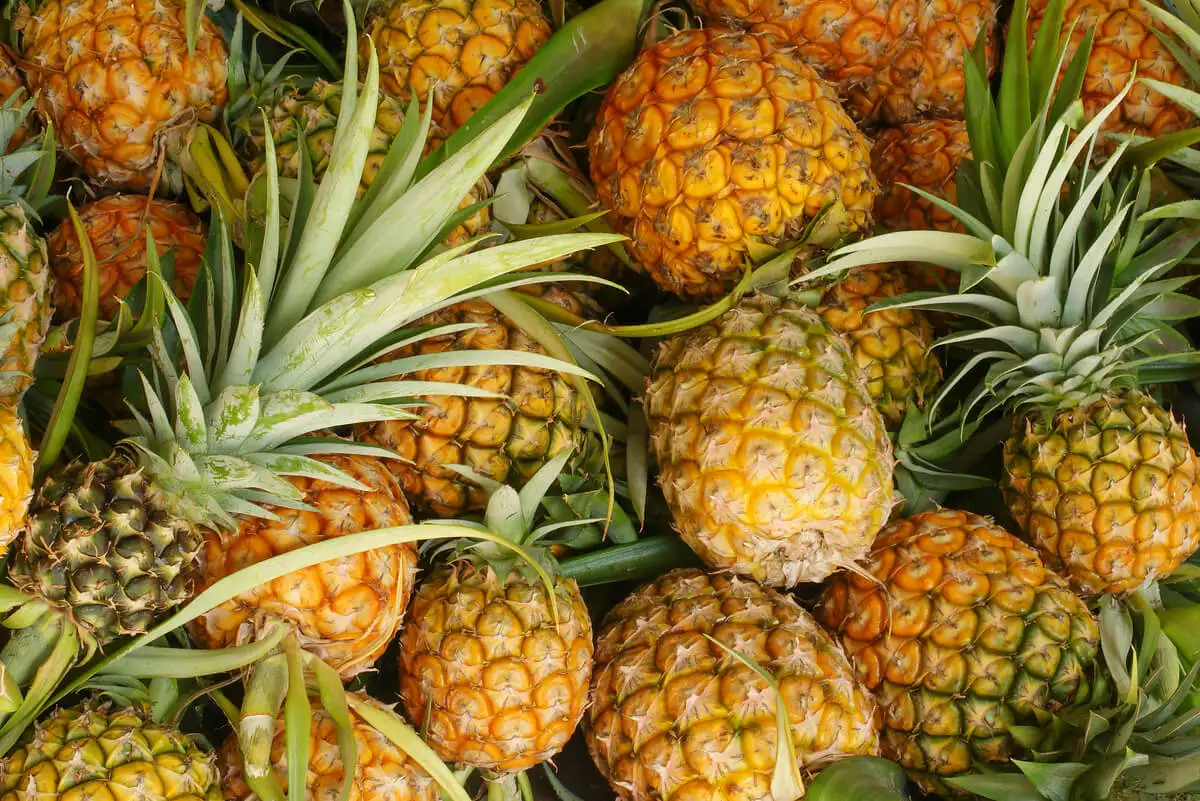What is Pineapple Bromelain and What Is It Used For?


Written and verified by the nutritionist Saúl Sánchez Arias
The bromelain contained in pineapple is one of the compounds with nutritional properties that generate a lot of interest in this fruit. Pineapples are one of the most consumed exotic fruits worldwide. Native to warm climates, this fruit has now spread throughout five continents.
This substance, bromelain, is nothing more than a set of enzymes capable of performing certain helpful functions on digestion. Pineapple owes much of its properties to this element. For this reason, we’re going to tell you all about the benefits of its intake and how you can take advantage of its potential.
Pineapple bromelain: A proteolytic enzyme
As we mentioned, bromelain is a set of digestive enzymes that have the ability to break down proteins into the amino acids that make them up. According to research published in the Journal of the Science of Food and Agriculture, it’s a substance that is marketed in isolation due to its properties.
It’s used to prevent digestive discomfort after large meals. This enzyme has proven to be useful in improving the metabolism of nutrients, making the process more bearable. In addition, it has other secondary functions, among which the following stand out:
- Anti-inflammatory
- Analgesic
- Antithrombotic
There’s even research that claims that pineapple bromelain could exert a regulatory function on the immune system, improving its functioning. This would be useful in preventing infections or transmissible diseases.
As science advances, properties and applications of the substance continue to be discovered. However, more scientific trials are needed to delimit the application frameworks precisely, as well as to systematize its dosing protocol. Currently, the best way for us to benefit from the enzyme is by consuming pineapple.

We think you may be interested in reading this, too: What Are the Benefits of Eating Pineapple at Night?
What is it currently known to help with?
Bromelain can be consumed after a large meal to reduce digestive problems or stomach heaviness. For this reason, pineapple is recommended after meals to facilitate the digestive function of the body.
In addition, the water content of the fruit will help to make the process of nutrient decomposition more bearable, reducing the risk of pain. Hydration prevents clinical pictures of constipation – for example, especially in patients with neurological disorders.
Since bromelain supplements are not yet common in the market, it’s best to resort to the consumption of pineapple as such. It is always necessary to avoid its presentation in syrup, since this way, it would have a much higher sugar content, which can be harmful to health.
Like this article? You may also like to read: Get Rid of Fluid Retention with Pineapple, Cucumber, and Horsetail
The side effects of bromelain
Although the intake of bromelain is almost always beneficial, its excessive consumption leads to the appearance of certain side effects. The most common are nausea, vomiting, diarrhea, and hypersensitivity reactions. However, this is not a frequent occurrence.
In addition, bromelain can interact with anticoagulants, so it’s necessary to consult a doctor about the possibility of consuming pineapple if you are under treatment with drugs of this type. It can also increase the effects of antibiotics by acting synergistically with them.
Other foods that promote healthy digestion
Bromelain is characteristic of pineapple, but it is possible to find other digestive enzymes in different foods. An example would be papaya, rich in proteases, which help break down proteins. Mango is another fruit that contains a significant amount of enzymes – in this case, amylases.
Other foods, such as avocados or kiwis, have compounds that help facilitate digestive processes, thus reducing discomfort associated with intestinal transit. Regular consumption of these fruits is associated with a decrease in constipation.

Pineapple bromelain facilitates digestive function
As you’ve seen, bromelain is a substance that helps to improve digestive processes. For this reason, its intake is recommended after a large meal. In parallel, it has anti-inflammatory functions, so it also helps prevent the onset of complex diseases related to systemic inflammation.
The best method that exists to ensure its consumption is the presence of pineapple in your regular diet. However, nowadays, supplements of this enzyme are beginning to be developed, given the new properties that are being attributed to it.
It is a safe substance since it has few side effects. However, it should be noted that it can interact with certain drugs, so it’s necessary to consult a specialist if in doubt.
If you experience frequent digestive problems, we recommend that you consume natural pineapple after meals. It can really help with digestive problems.
All cited sources were thoroughly reviewed by our team to ensure their quality, reliability, currency, and validity. The bibliography of this article was considered reliable and of academic or scientific accuracy.
- Mazila Ramli AN., Tuan Aznan TN., Illias R., Bromelain: from production to commercialisation. J Sci Food Agric, 2017. 97 (5): 1386-1395.
- Muhammad ZA., Ahmad T., Therapeutic uses of pineapple-extracted bromelain in surgical care – a review. J Pak Med Assoc, 2017. 67 (1): 121-125.
- Velderrain-Rodriguez, Gustavo, et al. “Effect of dietary fiber on the bioaccessibility of phenolic compounds of mango, papaya and pineapple fruits by an in vitro digestion model.” Food Science and Technology 36.2 (2016): 188-194.
- Rathnavelu V., Alitheen NB., Sohila S., Kanagesan S., et al., Potential role of bromelain in clinical and therapeutic applications. Biomed Rep, 2016. 5 (3): 283-288.
- Couso, Laura M. Ávila, et al. “Ensayo clínico controlado y aleatorizado. Constipación en pacientes con enfermedades neurológicas. Comparación de dos tratamientos (combinación de laxantes osmóticos y estimulantes).” Acta Gastroenterológica Latinoamericana 46.3 (2016): 192-200.
- Errasti, María Eugenia. Estudio de posibles aplicaciones farmacológicas de extractos de especies de bromeliáceas y su comparación con bromelina. Diss. Universidad Nacional de La Plata, 2013.
- Kaur, Lovedeep, and Mike Boland. “Influence of kiwifruit on protein digestion.” Advances in food and nutrition research. Vol. 68. Academic Press, 2013. 149-167.
This text is provided for informational purposes only and does not replace consultation with a professional. If in doubt, consult your specialist.








